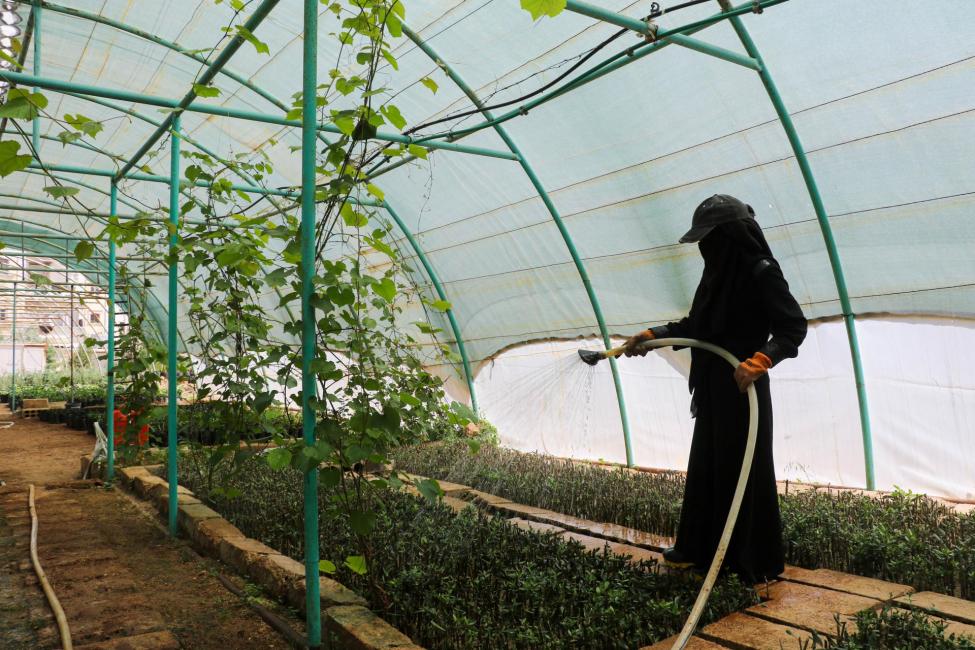-
Who We Are
WHO WE AREThe International Organization for Migration (IOM) is part of the United Nations System as the leading inter-governmental organization promoting humane and orderly migration for the benefit of all. IOM has had a presence in Türkiye since 1991.
About
About
IOM Global
IOM Global
-
Our Work
Our WorkAs the leading inter-governmental organization promoting since 1951 humane and orderly migration, IOM plays a key role to support the achievement of the 2030 Agenda through different areas of intervention that connect both humanitarian assistance and sustainable development. Across Türkiye, IOM addresses the full scope of migration issues, supporting and developing government capacity to manage migration.
Cross-cutting (Global)
Cross-cutting (Global)
- Data and Resources
- Take Action
- 2030 Agenda
Fatima Al-Moussa, 39, from Al-Bab in Northwest Syria has a new daily routine. She wakes up at 8 in the morning and goes to the plant nursery where she has a new job. She waters the plants, cleans them up, cuts harmful grasses, and puts saplings in place as instructed by her supervisor.
She returns home in the afternoon with money to feed her 6 children, one of whom has cerebral atrophy, and her husband who has a hand disability and is unable to work. Fatima is the sole breadwinner for the family that fled Aleppo in 2018 to the town of Al-Bab after the fighting intensified in the neighborhood where she lived.
Fatima is one of 500 displaced people in Northwest Syria benefiting from the Cash for Work programme that helps the communities there recover from the deadly earthquakes of last February by providing them with a temporary job and a source of income and involving them in the process of rehabilitating public assets and infrastructure.
“I was very happy when they asked me to come and sign the contract because it will allow me to have an income, even if temporary, and learn agricultural skills as I want to continue working afterwards,” said Fatima.
After moving to Al-Bab, the family relied on loans and charity to secure its needs. They live in an old house with a ceiling made of mud and wood and they pay $25 rent every month in addition to electricity and water bills.
Their living conditions have worsened as the earthquake left cracks in the walls and the ceiling of the house making it unsafe to live in.
“My children were very afraid that the ceiling would fall on them after seeing the cracks caused by the earthquake. We only live here because of need although it is unsafe for us,” Fatima said.
53,000 families were newly displaced in Northwest Syria in the aftermath of the earthquakes disaster which has only intensified the harsh conditions caused by the conflict in Syria. 4.1 million people there are currently in need of humanitarian aid.
In addition to direct assistance and providing various types of support, IOM, thanks to the generous contributions from the German Federal Foreign Office and through its implementing partners, has initiated the Cash for Work programme as part of its efforts to help affected communities recover from the devastating consequences of the February earthquakes.
Selected beneficiaries are engaged in activities like road maintenance, cleaning of public facilities, debris removal, and plant nurseries among others. The income they earn helps them secure their basic needs and for some, like Fatima, they learn new skills that can help them get a job after the programme ends.
"Access to livelihoods remains one of the top priorities in the areas most affected by the devastating February earthquakes. IOM provides short-term income-generating opportunities to the affected population through the Cash for Work programme, enabling beneficiaries to address their immediate needs. Thus, contributing to the recovery process of the communities," said Muhaned Alrubayee, Programme Officer at IOM.
Rising from the rubble
The Earthquake was a turning point for Ahmed Eid, a 45-years old displaced Syrian, and his family.
After multiple displacements since 2012, he settled with his wife and seven children in Harem, Idleb Governorate (Northwest Syria). Before the conflict erupted in Syria, Ahmed was an employee at a gas company, but he had to look for another income source. After years of saving the necessary money, he managed to open a small grocery store that provided a reasonable income for the family.
When the earthquake hit, Ahmed rushed to save his family and returned to help Neighbours in the area. He found that his store was under the rubble of the building.
“I lost everything. It was my only source of income,” Ahmed said. “After the earthquake I became a day laborer, I only work every other day,” he added.
Ahmed heard about the Cash for Work programme through social media, he then applied and got accepted.
“I now have a secure job for 40 days. It could have never come at a better time since it was Ramadan and Eid season which requires more expenses usually,” Ahmed said.


